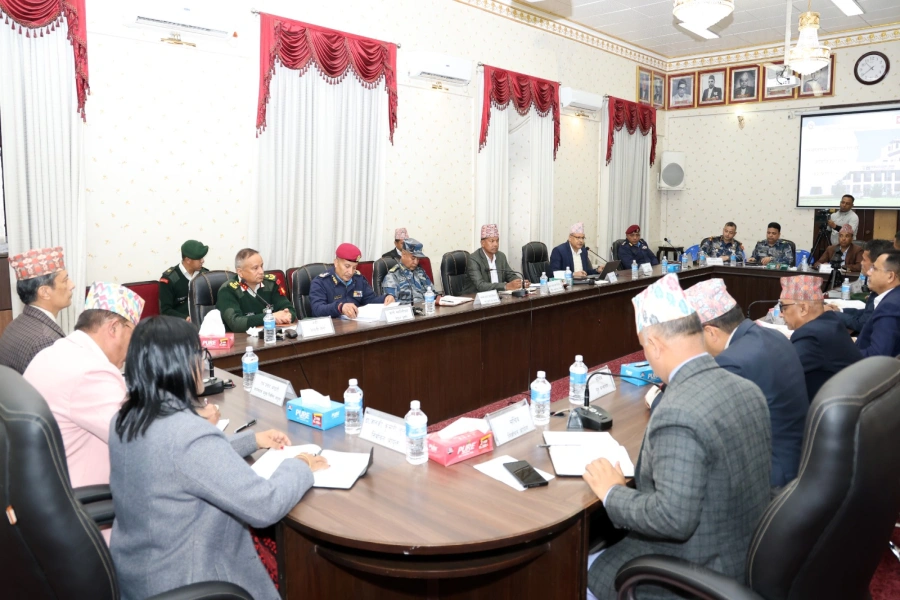KATHMANDU, Dec 4: Labor diplomacy plays a key role in driving the country's economic growth and development. Over 700,000 Nepali workers enter the domestic labor market annually. Many of them leave the country for employment. Government estimates show that about 3 million Nepalis work abroad, primarily in Malaysia and various Gulf countries. However, Nepal's diplomatic efforts to protect their rights, benefits, and security remain weak. In the fiscal year 2023/24, as many as 741,297 Nepalis secured labor approval and went abroad for employment, including 661,125 men and 80,172 women.
Nepali workers primarily choose the UAE as their destination. In the fiscal year 2023/24, 193,438 Nepalis secured labor approval to work in the UAE. Saudi Arabia is the second most popular destination. During the same year, 629,135 Nepalis obtained labor approval to work in Malaysia and Gulf countries, including Saudi Arabia, Kuwait, Qatar, UAE, Bahrain, and Oman.
Unscrupulous agents target Nepali workers even before they leave the country. Once abroad, employers fail to deliver promised jobs, salaries, and benefits, forcing workers to endure low wages and unfavorable conditions. Nepal has failed to sign bilateral labor agreements with many destination countries, forcing Nepali workers to comply with restrictive host-country rules.
Nepal has failed to ensure that its employees in foreign diplomatic missions prioritize labor-friendly initiatives. Although it has assigned counselors and labor attachés to various diplomatic missions, the expected results have not materialized. Kul Prasad Karki, the former president of the Prabasi Nepali Coordination Committee (PNCC), points out that multiple factors raise concerns about labor diplomacy.
The Nepali embassy in the host country serves as the primary institution responsible for protecting migrant workers. Diplomatic staff in embassies play a crucial role in resolving and managing workers' issues. However, Karki highlights that the embassies in destination countries are often too weak, which causes hardships for Nepali workers.
He stated, "Most countries do not specify labor diplomacy. Even when small or major incidents occur abroad, discussions are limited to brief mentions during political visits. There is no clear evidence of work being done with specific responsibilities in the planned program." According to him, authorities must address worker issues with the necessary documents and evidence.
Malaysian govt decides to impose ban on migrant workers from Ju...

He emphasized that the embassy should file cases in the labor courts of the host country to address workers' issues, rather than bringing them back to Nepal to avoid the problem. Due to the policies and conditions in destination countries, the embassy, along with the Ministry of Labor, Ministry of Foreign Affairs, and the Department of Foreign Employment (DoFE), has failed to resolve migrant workers' issues or provide the necessary rescue and aid.
He states that when migrant workers face problems abroad, both the DoFE that can direct manpower companies to assist and the embassies and Foreign Employment Board, which should lead rescue efforts, often avoid their responsibilities. Moreover, embassies hesitate to listen to complaints from victims outside office hours and fail to take immediate action. Does victimization only happen during office hours? To address labor issues, the Nepali government has appointed 12 counselors and labor attachés in eight countries (Saudi Arabia, Malaysia, Qatar, UAE, South Korea, Oman, Kuwait, and Bahrain). Saudi Arabia, Malaysia, Qatar, and UAE each have one counselor and one labor attaché, while South Korea has only one counselor, and Oman, Kuwait, and Bahrain each have one labor attaché.
Employees sent by the Ministry of Labor, Employment, and Social Security should serve as labor diplomats. However, Karki accuses them of exploiting victims instead of addressing the complaints of workers from various countries. Labor and migration expert Saru Shrestha Joshi argues that ordinary workers have never felt that the embassy is their home. There is no labor diplomacy in place to help workers benefit. If any party or government focused on labor diplomacy, many workers could have seen improvements in their conditions. Joshi also believes that ambassadors assigned to specific countries should prepare in advance to advocate for workers' rights and interests.
She said, “To improve labor diplomacy, ambassadors and other staff members going abroad must have knowledge about the respective countries.” She added, “Except for a few, most ambassadors, counselors, and labor attachés are chosen based on party interests, aiming to benefit during their tenure. There is also a tendency to oppose others and seize opportunities when available.” Joshi emphasized that ambassadors and staff should work strategically and actively perform their duties while stationed at the embassy. Staff members focus little on how to conduct health screenings for workers. Furthermore, there is limited attention given to assisting workers who return to the country after working abroad.
The Ministry of Labor established the Foreign Employment Act in 1985, which marked the official beginning of Nepal sending workers abroad. Due to weak labor diplomacy, Nepal has signed labor agreements with only 12 countries so far. In countries where Nepali workers have gone, the absence of labor agreements has led to hardships for them. As a result, workers' welfare in these countries has not been adequately protected. Workers who went abroad to earn money have had to bear excessively high fees. Furthermore, they have been forced to accept low wages and poor working conditions.
Tamra Raj Kafle, the labor attaché for Saudi Arabia in Nepal, explained that labor laws in the market are gradually becoming more worker-friendly, and both labor laws and administration are now technology-oriented. However, those who lack knowledge of technology have fewer opportunities to benefit from it.
He pointed out that Nepali workers going to Saudi Arabia often face exploitation and suffering due to their lack of understanding of local labor laws and their inability to utilize the technology-driven labor administration and judicial system. "A major complaint from workers coming to Saudi Arabia is the language barrier, along with manpower agencies and agents enticing them with promises and dreams that often exceed what is listed in the job description," he said. "Skilled workers who come here rarely face difficulties."
Many workers abroad have suffered greatly due to employers. The main issue is employers' failure to provide the salary, work, and other benefits as outlined in the contracts. The embassy's diplomatic pressure, despite a firm stance in favor of workers' rights, has not been effective, leaving workers in distress. He explained that while most employers in Saudi Arabia are good, others are not. Workers in good companies with regular earnings and benefits rarely seek media attention or contact the embassy. However, those who suffer often share their hardships everywhere and seek help, which is why only suffering is visible.
Nepali workers have obtained institutional labor approval from 111 countries and individual labor approval from 178 countries for foreign employment. However, weak labor diplomacy continues to cause hardships for Nepali workers. "We have not been able to make contemporary and simpler foreign employment laws," he said. "Another major issue is our failure to engage in diplomatic efforts and discuss with the Saudi government to address both their concerns and ours through a bilateral labor agreement. Many issues require improvement on our side."
Counselors and labor attachés play a crucial role in protecting workers' rights, rescuing them in times of trouble, and resolving disputes between employers and workers. However, many Nepali workers complain that when they face problems abroad and approach the embassy, officials do not listen to their issues. Severely affected workers widely express frustration that the embassy and labor officials have failed to effectively resolve their problems.
Rajendra Bhandari, president of the Nepal Association of Foreign Employment Agencies, says that labor diplomacy is extremely weak when it comes to supporting the welfare of workers abroad. He said that no significant work has been done for workers living abroad. He points out that the lack of effective labor agreements with the relevant countries has led to numerous problems, where necessary tasks remain undone while the unnecessary ones are carried out. He acknowledges that various issues stem from Nepal's weak labor diplomacy.
He says the Nepali government should focus on appointing or training diplomats who can effectively address the problems of migrant workers in destination countries. "Labor diplomacy is extremely weak and underdeveloped. This system and practice harm the country's internal development and the welfare of workers in the entire labor sector," he said. The situation of women going abroad as domestic workers from Nepal is pitiable. The government has failed to stop this practice. Women travel abroad for domestic work through agents and brokers via various channels. Many of them, sold by brokers and traveling irregularly, end up suffering and are unable to file complaints once they arrive.
Mukunda Prasad Niraula, the Secretary of the Ministry of Labor, stated that the problems faced by workers abroad are the primary issues, making it essential to strengthen diplomatic efforts to create a worker-friendly environment. He emphasized that embassies in the respective countries must inform local authorities about these issues. Niraula also suggested that the government invite officials from the embassies of labor destination countries in Nepal and remind them to focus more on the welfare and promotion of Nepali workers abroad. "By taking the initiative to sign labor agreements with the countries where most workers go, the government could strengthen labor diplomacy," he said.
Migrant workers are not only stranded in Malaysia and Gulf countries but also in Europe and America, where they are promised attractive salaries and jobs, only to be left stranded in various countries. Victimized workers have reported receiving no assistance from the government. According to labor and migration expert Ganesh Gurung, government agencies involved in labor diplomacy and the facilitation of migrant workers' issues have failed to provide proper support, leading to various obstacles. As a result, many workers who want to return home due to problems abroad find themselves stuck in their destination countries.
"Lack of labor diplomacy is a major issue for us. We opened embassies in Gulf countries, Malaysia, and other nations with a large number of workers primarily for labor diplomacy," Gurung said. "However, the embassies created for workers' protection have not done much to improve their welfare. They mostly handle routine tasks, like passport renewals and sending documents for deceased workers' certification, with little else being done." He continued, "What we need is labor work. The government should be informed about the specific skills required in these countries.
There is no clear strategy for signing labor agreements for Nepali workers or improving bilateral relations." He emphasized that the lack of effective labor diplomacy has caused workers to suffer. "Ambassadors have been appointed based on political selection. They go there and speak without any clear direction. No one cares. That’s not labor diplomacy. We need to send staff who can discuss issues and work toward solving problems for the welfare of workers," he said.
























-1200x560-1771928761.webp)










